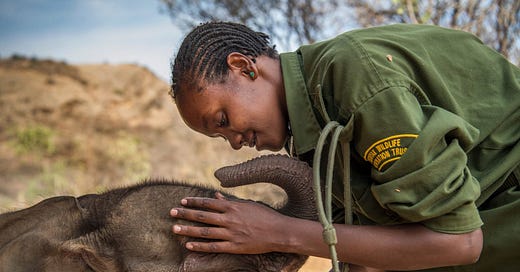It’s the middle of the night, and somehow I have returned to the mountains and plains of Northern Kenya. In a language I can understand only while dreaming, I have been invited to skim mud from the surface of a freshly dug singing well with a carved wooden cup. Voices rise above the trumpeting of elephants and the bleating of goats. My body awkwardly recalls the gestures of this ritual. An upward whistle follows every earthly bow according to a rhythm passed from voice to voice through generations.
Suddenly, I awaken in my bed — a world away, thick with fatigue, and feeling vaguely bereft. Did I fail the task? Now, how will that murky groundwater ever run clear?
My senses tenderized by the dark, I shuffle through my unlit home and touch the minor attributes of this particular life: a thick cashmere throw I bought along the Irish coast, the flecked stone countertops my children love to run their hands along, the soft, sage leaves of a potted plant. Our home seems to have settled back into its bones in our time away. The garden has filled greenly in the monsoon rains, and plump raspberries are ready to be picked and eaten.
For the Samburu, the semi-nomadic pastoral people of Northern Kenya, daily life is organized according to the law of water, blood, milk, and meat. The sacred dwells in higher places. Homes are shoulder-height and constructed of straight sticks mixed with mud, dung, and ash paste. They are situated such that a Samburu must bow toward the mountain each time he enters. A circular briar enclosure keeps the camels, cows, and goats in and the leopards and lions out.
Our friend, Tilas, explains that the marbling on his calf came from the blaze of a lion’s paw, a relic from when he was a young warrior, freshly circumcised, with an able spear. He touches each plant, naming its properties and uses as we walk. Tilas introduces us to the stars, explaining how they determine when and for what his people pray. He traces a line from Alpha Centauri to Beta Centauri to Gacrux at the tip of the Southern Cross. When asked about his home, he nods over the mountain: “Under the full moon, it’s a six-hour walk.”
In recent years, the Samburu have built an indigenous-owned conservancy for wildlife, the first orphanage of its kind in Africa. Reteti is home to an absurdly cute troupe of 47 baby elephants. Five times daily, they are bottle-fed goat milk provided by herders from the surrounding villages.
“Elephants remember everything; we help them remember they belong.”
When new orphans arrive, often in the aftermath of trauma, the keepers cradle them, sleep alongside them, and surround them with the healing chants they learned around the singing wells of their youth — sometimes night and day for weeks. After years of care and intentional preparation, the elephants are returned within their adopted family systems to the lands from which they came.
“Most of us have been displaced from those cultures of origin, a global diaspora of refugees severed not only from the land but from the sheer genius that comes from belonging in symbiotic relation to [it].” ― Tyson Yunkaporta, Sand Talk: How Indigenous Thinking Can Save the World
It’s not that I long for any home but this one. Lord knows I bristle at the implicit expectations of women even in this privileged world — expectations that pale in comparison to the norms of most women’s lives around the world. But it is a transmission of the spiritual force of symbiosis to be among the Samburu. Some primal memory stirs in proximity to a culture that still listens for water in the earth and prays according to the mountains, stars, and seasons. Indeed, there is earthly sanity — “sheer genius” — in remembering that we are not orphans among the family of things and that our rightful place is as an intermediary, guardian species.
As daylight rises, I climb a nearby mountain to survey the valley beneath. This valley contains the daily rituals of my human life. It is where I drive my children to school and share meals with friends. From this vantage point, I can close my eyes and imagine buildings and highways gently swept like eraser shavings from a living canvas, revealing a landscape beneath our human claim. When I dream of singing wells, I remember an irreducible wilderness, a relationship that has always been — and find solace in it.





